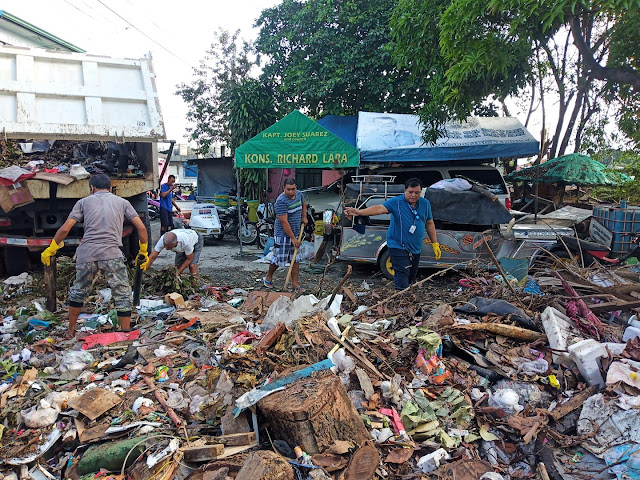Green Groups Seek IATF Nod for Waste Workers’ Inclusion in COVID-19 Vaccine Priority List (Expanded A4 category among priority population groups must include environmental frontliners, too)
17 April 2021, Quezon City. Several green groups
insisted that the unsung environmental frontliners, particularly waste workers,
must also be considered as a priority sector for COVID-19 vaccination.
Through a letter sent yesterday to the
Inter-Agency Task Force on Emerging Infectious Diseases (IATF-EID), the
pro-environment groups, including community-based organizations of informal
waste recyclers, roundly appealed for the vaccine prioritization of workers
involved in the management of municipal solid waste, healthcare waste,
commercial and industrial waste, and hazardous waste.
“We hope the IATF will positively act on our
collective appeal and include the environmental frontliners from the waste
management sector as a priority population group for the ongoing immunization
program,” said Aileen Lucero, National Coordinator, EcoWaste Coalition.
“Ensuring early access to COVID-19 vaccine will
undeniably provide health and economic benefits to our waste workers and their
families,” she said. “Access to COVID-19 vaccine, especially for the
marginalized groups, is health and economic justice.”
"Sandatang
maituturing ang bakuna laban sa COVID-19 ng mga manggagawa sa sektor ng basura
na hindi inaalintana ang hirap sa peligrosong trabaho. Bilang
pagkilala sa aming mahalagang serbisyong pangkalikasan ay maisama nawa
kami ng IATF sa mga prayoridad na sektor upang kagyat na mabakunahan at
maprotektahan," said Joanna Amican of the Nagkakaisang Lakas ng mga
Mangangalakal sa Longos, Malabon City.
The groups cited five key reasons to justify the
further expansion of the COVID-19 A4 category vaccine priority list to include
the environmental frontliners from the waste management sector:
- Waste workers perform essential service to the community and the environment.
- Waste workers are engaged in a high risk job that may involve contact with materials and surfaces possibly contaminated with SARS-CoV-2.
- Low levels of waste segregation at source increase waste workers’ exposure to infectious waste.
- Waste workers are prone to occupational health risks resulting from mixed waste disposal, their manual handling of waste, and their lack of protective gear.
- Lockdowns to contain the spread of COVID-19 have seriously disrupted the work of informal waste workers who are meager daily wage earners, pushing them further into hunger and poverty.
Informal waste workers who stand to benefit from
early vaccination against the disease if the A4 category is further expanded by
the IATF include waste pickers or reclaimers, itinerant waste buyers, jumpers
at collection trucks, e-waste dismantlers, junk shop owners and others engaged
in the recovery of recyclable materials to generate income.
Formal waste workers who could also benefit from
prompt inoculation include waste collection crew, waste truck drivers, street
sweepers and other waste and sanitation workers employed by local government
units, waste management companies, homeowners’ associations, etc.
Based on the survey conducted by waste workers’
groups, their members are, by and large, keen to be vaccinated against COVID-19
to protect themselves from the dreadful disease, and to ensure their income and
food security.
For instance, of the 337 individuals who
participated in the said survey, 246 (94 female and 152 male) would like to
receive the vaccine and 302 (129 female and 173 male) favor putting waste
workers on the priority vaccine recipient list.
Aside from the EcoWaste Coalition, the
aforecited letter to the IATF was signed by the Nagkakaisang Lakas ng mga
Mangangalakal sa Longos Malabon City; Samahan ng mga Mangangalakal sa
Capulong, Tondo, Manila; Samahan ng mga Mangangalakal sa San Vicente
Ferrer, Camarin, Caloocan City; Samahan ng mga Mangangalakal sa Bagong
Silang, Caloocan City; and the Gagmay'ng Kristohanong Katilingban (GKK)
Lihok Pagtinabangay Multipurpose Cooperative Inayawan, Cebu City.
Break Free from Plastic PH, Global Alliance for
Incinerator Alternatives, Mother Earth Foundation, Oceana Philippines






Comments
同学们在收集资料的过程中就可以准备一个便携的笔记本,遇到跟自己论文内容相关的内容就可以把期刊名称、作者、 页码、 标题等关键信息记录下来,后期正式开始写作之后,就能省去很多重新寻找资料的时间。议论性研究论文通常是针对有争议的问题展开论述,需要大量的理论依据和事实论据,而这些信息就要从收集到的资料中寻找。而分析性论文则是要提出一个新的解决方法或是思路,也需要从收集到的资料中寻找相关信息,证明自己的观点,让读者信服。